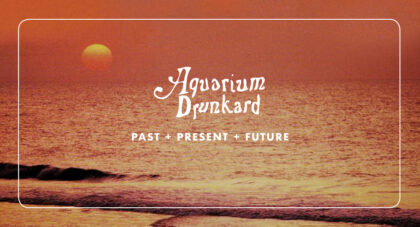Since forming the Mountain Goats in 1991, John Darnielle has sung about remarkable people: wounded couples, Texas death metal aficionados, doo wop singers, professional wrestlers, horror authors, heretics, prophets, long-dead classical pianists, and occasionally, John Darnielle. He works along the fringes, building up narratives around his pop cultural obsessions and consistent empathy. In a John Darnielle song, no matter how sad, human beings are never reduced to caricatures. They are always treated with a profound respect.
On the Mountain Goats' new album, Goths, Darnielle turns his attention to the death and darkness obsessed subculture that emerged in the U.K. in the early 1980s. In typical Darnielle style, the songs are sweet and understated. It's a record about aging and identity, about cultures shifting around us. Goths talk to other goths, and outsiders try to figure out goths: in "Rage of Travers," Darnielle crafts a fictional epic about '70s blues rock guitarist Pat Travers wondering why the hell Bauhaus won't let him sit in at a gig at the storied London nightclub the Batcave. It's a record about time moving on, whether or not we're okay with that sort of thing.
The record is occasionally nostalgic -- "Outside it's 92 degrees/And KROQ is playing Siouxsie and the Banshees" he sings longingly on "Stench of the Unburied" -- but the record also charts new ground for the long-running band. Though the group's recent records have embraced a certain smoothness, Goths leans even heavier into AOR gloss and sheen. Darnielle doesn't play guitar on the album, sitting instead at a Fender Rhodes, and presents his distinct voice is new, tempered ways. It's a band record; the interplay between rhythm section Peter Hughes and Jon Wurster shines on "Unicorn Tolerance," and multi-instrumentalist Matt Douglas works in crafty, engrossing woodwind arrangements on "Paid in Cocaine" and "The Grey King and the Silver Flame Attunement."
The album comes hot on the heels of Universal Harvester, Darnielle's third novel, following 2008's Black Sabbath: Master of Reality for the 33’…“ series and 2014's Wolf in White Van. It's about a video store in Nevada, Iowa. A clerk there, Jeremy, and the store's owner Sarah Jane, begin to discover disturbing scenes recorded over chunks of VHS tapes returned to the shop. Their investigation brings them into contact with a mysterious woman named Lisa Sample, and face to face with the concept of grief.
Both Goths and Universal Harvester center around the ways we ask art to speak for us, how we ask it to offer forms of expression for things that sometimes feel too deep to name. The book and the record are both informed by Darnielle's stubborn and pervasive humanism. Aquarium Drunkard called him up to discuss his ethos, vocal jazz, and growing as a writer. Here's that conversation.
Aquarium Drunkard: You sing really incredibly on this record. Was that something you worked hard to do for Goths?
John Darnielle: I really worked hard to sing as best I could. I really think I’ve grown as a singer. That’s a hard thing to sell people on when they think of you as the guy with the pushing, nasal voice, which I do have. I have one of those assaultive registers. I have a register that a lot of people really like [but] either you love it or hate it. But I’ve grown as a singer a lot over the last couple records and I’ve embraced that.
Only the good shit. Aquarium Drunkard is powered by its patrons. Keep the servers humming and help us continue doing it by pledging your support.
To continue reading, become a member or log in.


